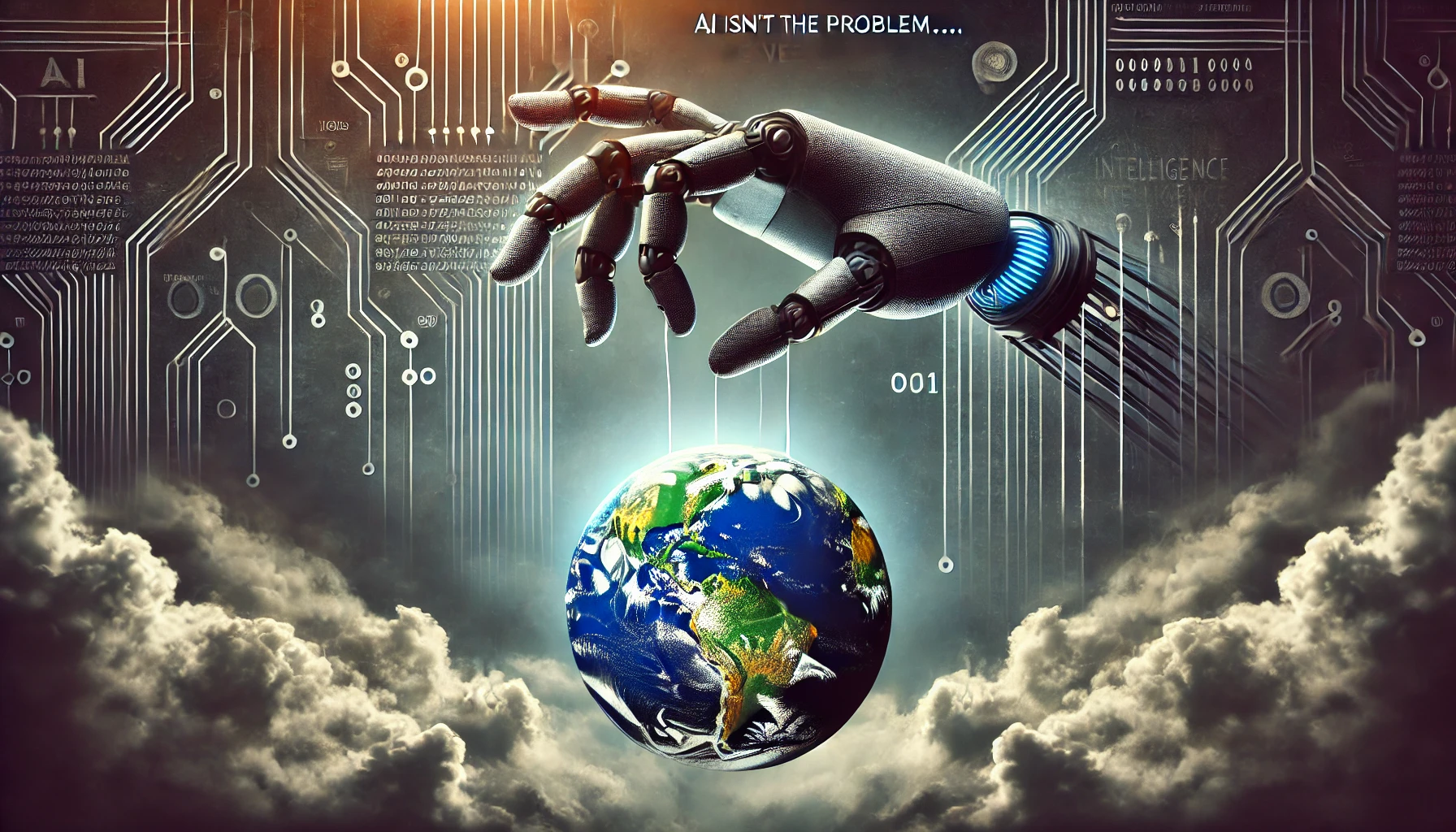Artificial Intelligence (AI) has taken the world by storm. From chatbots that mimic human conversation to algorithms that predict our next purchase, AI is everywhere. But let's get one thing straight: AI itself isn't dangerous. It's a tool—a remarkably powerful one—but just a tool nonetheless. The real threat comes from how we choose to use it. And frankly, we're screwing it up.
The Illusion of AI Competence
AI can produce results that often seem acceptable, even impressive. It can draft emails, analyze data, and even create art. This creates an illusion of competence that leads many to overestimate its capabilities. But let's not kid ourselves—AI doesn't truly understand what it's doing. It doesn't comprehend context, nuance, or ethics. It operates based on patterns and data we've fed into it, nothing more.
Yet, people are increasingly relying on AI to make decisions, complete tasks, and even replace human interaction. This overreliance is not just misguided; it's dangerous. We're handing over control to algorithms without fully understanding the consequences.
Public Perception: Swinging Between Extremes
The public's view of AI swings wildly between awe and fear:
- The Doomsayers: Some believe AI will lead to mass unemployment, societal collapse, or even an apocalyptic scenario where machines overrun humanity.
- The Utopians: Others see AI as a flawless tool that will solve all our problems, from curing diseases to ending world hunger.
- The Opportunists: Then there are those who think AI is a shortcut to success—a way to make money without putting in the work.
All these perspectives miss the mark because they attribute too much agency to AI itself. They ignore the human choices behind every application of AI technology.
Corporate Misuse: Short-Term Gains Over Long-Term Viability
Let's talk about corporations replacing employees with AI. On the surface, it seems like a cost-saving measure. Fewer salaries to pay, more efficiency—what's not to like? But this approach is shortsighted and, to be blunt, I'd call it unwise (even though the people making these decisions are usually smart).
Here's why:
- Loss of Human Insight: AI can't replicate human creativity, critical thinking, or emotional intelligence. By replacing humans entirely, companies lose these invaluable assets. They won't get that occasional extra spark of innovation while still keeping all the potential errors.
- Customer Relations Suffer: Ever been stuck in an endless loop with a chatbot that doesn't understand your problem? That's what happens when companies prioritize automation over genuine customer service. No matter how advanced the chatbot is, customers can tell they're not speaking with a person.
- Employee Morale Plummets: When employees see their colleagues replaced by machines, it creates a culture of fear and mistrust. Productivity and loyalty take a hit. It's not just "Will I be next?" but "When am I out?"
As you can tell, I find this to be simply the wrong approach, and that's why at LINK-V, we do things differently. We use AI to enhance our team's capabilities, not replace them. AI handles the grunt work—data entry, basic analysis, explaining complex topics—freeing up our people to focus on strategy, innovation, and building relationships. The result? Higher quality output and a happier, more engaged team. Our output quality has significantly grown while we're able to deliver faster. Clients are happy!
The Slippery Slope of Complacency
On the flip side, some employees are using AI to do their jobs for them. Instead of leveraging AI to improve their work, they're letting it be their work. This isn't just lazy; it's a one-way ticket to obsolescence.
Consider the consequences:
- Skill Atrophy: Relying on AI erodes your skills. When you stop practicing, you stop growing. Before you know it, you're no longer valuable to your employer—or anyone else. Yes, even friends may lose interest, because you might start losing touch with them too.
- Ethical Pitfalls: Passing off AI-generated work as your own is dishonest. It undermines the trust between employer and employee and can lead to serious ethical breaches. I know this sounds like something out of an employee handbook, but that's exactly what will happen slowly without you even noticing.
- Missed Opportunities: AI can handle routine tasks, giving you the chance to take on more challenging work, learn new skills, and advance your career. Ignoring this is a waste of potential. You should build on AI’s work, which helps you learn and advance.
Underlying Issues: Misaligned Priorities and Values
The misuse of AI is a symptom of deeper problems:
- Corporate Greed: Companies replacing staff with AI to cut costs may boost short-term profits but jeopardize long-term success. They're prioritizing shareholders over stakeholders—a strategy that's been proven disastrous time and again.
- Lack of Purpose: Employees relying entirely on AI may be too disconnected from their work. If a person works only for a paycheck, it's no wonder they avoid any work they can and use AI as the sole author of their output. Remember, an employee is a person. Unfortunately, many people have no reason to do anything beyond earning enough to ensure a level of comfort. Those are the ones relying on AI absolutely.
- Unhealthy Business Models: Many modern venture startups begin with unsustainable business models—they're going for loss from the get-go. They're expected to burn money for years, but at some point, they face reality—they need to start making money. Most such businesses never get there, so they jump on the opportunity to cut tens or hundreds of jobs and replace them with mediocre, non-growing AI output.
AI Needs Human Collaboration to Thrive
In any human endeavor, output isn't just created in isolation and left unchecked. We naturally collaborate, verify each other's work, communicate goals, adjust processes, and adapt to new information—all often without consciously realizing we're doing it. Humans are inherently social creatures who bring context, understanding, and a shared sense of purpose to the tasks we undertake.
However, when it comes to AI, there's a misguided expectation that it can function autonomously without any of this human interplay. People often deploy AI systems and expect them to perform flawlessly right out of the box, without guidance, oversight, or integration into a broader team context. This is like hiring a new employee and expecting them to excel without any training, support, or communication—a recipe for disaster.
AI lacks:
- Implicit Understanding of Goals: Unlike humans, AI doesn't inherently grasp the objectives behind tasks. It executes commands without understanding the bigger picture or the nuances that might influence how a task should be performed.
- Team Dynamics: AI doesn't participate in team interactions. It doesn't attend meetings, share insights, or adjust its approach based on collective input.
- Adaptive Learning in Context: While AI can learn from data, it doesn't adapt in the moment based on subtle cues or changes in the environment the way humans do during collaborative work.
Expecting AI to operate effectively under these conditions is setting it up as a worse worker under worse conditions. Without human collaboration, AI is prone to errors, misalignment with goals, and a lack of adaptability. It doesn't receive the feedback loops that are crucial for refining and improving output.
In reality, AI needs us just as much as we can benefit from it. By integrating AI into our teams—providing oversight, setting clear goals, verifying outputs, and facilitating adjustments—we enhance its effectiveness. Humans bring the intuition, ethical judgment, and contextual understanding that AI lacks. Together, we can achieve results that neither could accomplish alone. But let AI go unchecked and alone, and the best you can hope for is that your managers and customers will soon notice stiffness, something's different, something's wrong.
The Bright Side: AI as an Enabler
When used correctly, AI is an incredible asset:
- Accelerated Growth: Startups and small businesses can scale faster by automating routine tasks.
- Enhanced Creativity: AI can handle the mundane, giving humans more time and mental energy to innovate and think creatively.
- Accessible Knowledge: AI can serve as a tutor or mentor, providing instant answers and learning opportunities.
AI chat is often the first (and ONLY as the first) resource I go to when I'm acquiring new knowledge, getting to understand a new field, which speeds up my learning.
For those willing to embrace AI as a partner rather than a replacement, the possibilities are endless.
Conclusion
In the end, it's up to everyone how they use this tool—and why they do. Just don't blame the tool. AI isn't going to end this world. If anything, a human will. And we don't need AI for that; we have pretty strong means already.
You can ban AI, you can set guidelines, and although these are not the best methods to deal with AI tools, they may be the only ones you have. I know many people who will use AI as much as they can to avoid as much work as they can. Still, it's not the fault of AI; it's a fault of their environment, of society, their own, their families—they just don't see value in what they do or anything they can do, and an employer, a manager, a coworker, or technology of any kind won't change that.
Just don't blame the tool; look for the cause.

